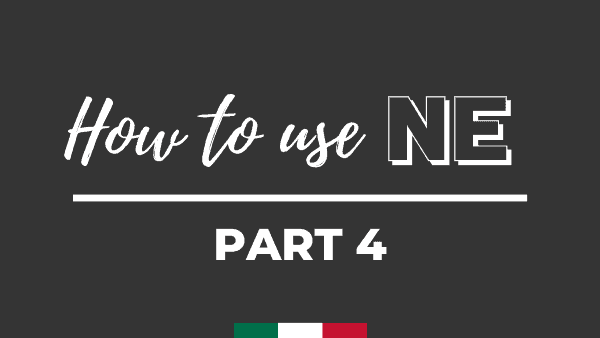What is the difference between IMPERFETTO and PASSATO PROSSIMO?
Sherrie asks: When do I use the IMPERFETTO over the PASSATO PROSSIMO or… what's the difference between these two past tenses?
Understanding when to use one over the other tense is tough and most students struggle with this. So you are not alone!
The main reason so many English speakers struggle with the IMPERFETTO is that it's not clearly visible or recognizable in English (unlike a Future tense, or a Conditional).
Hopefully this guide will be of some assistance.
Download the PDF
No email required
Let's start with a basic distinction between the PASSATO PROSSIMO and the IMPERFETTO in Italian.
PASSATO PROSSIMO
Used for an action (something) that happened in the past. It has a start and end point.
▷ SOME EXAMPLES
IERI HO MANGIATO UNA PIZZA
Yesterday I ate a pizza
10 ANNI FA SONO ANDATO IN ITALIA
10 years ago I went to Italy
Both actions sound totally concluded, right?
IMPERFETTO
Is used for an action (or something) that happened in the past that does not have a clear time/start/end and that is presumably carried out for a longer (or undetermined) period of time.
▷ SOME EXAMPLES
QUANDO ERO PICCOLO MANGIAVO SEMPRE LA PIZZA
When I was young, I always ate pizza
QUANDO ANDAVO IN PISCINA, DI SOLITO PER DUE ORE
When I went to the pool, I used to swim for two hours
IMPERFETTO
It is also used to describe something, in the past (nothing happened).
▷ SOME EXAMPLES
LA MIA PRIMA MACCHINA ERA ROSSA
My first car was red
5 ANNI FA MARCO AVEVA UNA RAGAZZA SVEDESE
5 years ago Marco had a Swedish girlfriend
QUANDO SONO ANDATO IN ITALIA 10 ANNI FA, FACEVA MOLTO CALDO
When I went to Italy 10 years ago, it was very hot
In the first example, I am simply describing my car in the past. Nothing happened.
In the second example, all I am saying is that 5 years ago, for the whole time, Marco had a Swedish girlfriend. Again, it's a description in the past. It would be a different story if I was saying that HE MET a Swedish girl, because then we'd be talking about an action that took place and ended (the “meeting” of someone happens once, in an instant).
The third example is another description, saying that the whole time I was in Italy (10 years ago) the temperature was high. Nothing happened. I'm not saying that there was a huge thunderstorm on the 7th of August, right?
The IMPERFETTO is just that: imperfect!
The IMPERFETTO does not tell a full story.
It just sets the scene for what actually happened (usually expressed with the PASSATO PROSSIMO or PASSATO REMOTO, or other past tense).
Here are 4 Questions you can ask yourself to determine whether you should be using the IMPERFETTO in Italian
Question 1
Did anything actually HAPPEN?
If the answer is NO then you need to use the IMPERFETTO.
▷ SOME EXAMPLES
My car was red – la mia macchina era rossa
Yesterday it was hot – Ieri faceva caldo
I was young – Ero giovane
It was 5 o'clock – Erano le 5
The fact that my car was red, that yesterday it was hot, that I was young and that it was 5 o'clock are just descriptions in the past. Nothing actually happened.
Question 2
Is it a HABIT (that could be rephrased with “USED TO” or “WOULD ALWAYS” in English)?
If the answer is YES then you need to use the IMPERFETTO.
▷ SOME EXAMPLES
When I went to the pool I used to swim for two hours
When I was young I played basketball
When we were young we always visited grandma for Easter
I am saying that I USED TO swim for two hours, that I USED TO play basketball and that we WOULD ALWAYS visit grandma.
Quando andavo in piscina, nuotavo per due ore
Quando ero piccolo, giocavo a basket
Quando eravamo piccoli, andavamo sempre a trovare nonna per Pasqua
Learn Italian to Fluency
- The program you've been dreaming of is here
- Better than having a private tutor
- In-Depth Italian lessons for complete clarity
- Extensive pratice opportunities
- Access to our community - you are never alone!
- A true learning experience to Italian Fluency
Question 3
Is it a CONTINUOUS ACTION in the past?
If the answer is YES then you need to use the IMPERFETTO.
If the event you are trying to report is ongoing action/verb, then you will need the IMPERFETTO. How do you know? You would use the TO BE -ING construction in English!
Yesterday I was singing
They were selling apples at the markets
I was thinking we should go to the movies
The thing that these sentences have in common is that they don't really tell a finished story. “Yesterday you were singing AND…???”. They are incomplete, or imperfect sentences!
Ieri cantavo
Al mercato vendevano mele
Pensavo che dovremmo andare al cinema
Question 4
Is there any TIME REFERENCE that would suggest that the action was ONGOING?
If the answer is YES then you need to use the IMPERFETTO.
Some expressions make it more clear that you should be using the IMPERFETTO.
Da piccolo – when I was young
Da giovane – when I was young
Spesso – often
Sempre – always
All suggests a habit, don't they?
Now, don't take this as a rule, since I could also use a PASSATO PROSSIMO with the above expressions, but they do offer a guideline.
join our italian community
- Access a ton of content on this website
- Weekly Digest with a ton of Italian lessons, videos & facts!
- Invitation to Live Q&A Lessons with Manu
- Invitation to exclusive Webinars, Live Lessons & Games
- Coupons, Discounts & Specials for our Premium Italian Courses
The horrible truth:
In many cases, both PASSATO PROSSIMO and IMPERFETTO are possible. It all depends on the story you are trying to tell.
▷ AN EXAMPLE
QUANDO VIVEVO IN ITALIA MANGIAVO SEMPRE LA PIZZA
When I lived in Italy, I always ate pizza
When I used to live in Italy, I would always eat pizza
The eating of the pizza is a description of what I did the whole time I was in Italy.
QUANDO VIVEVO IN ITALIA, HO MANGIATO UNA PIZZA FANTASTICA A NAPOLI
When I lived in Italy, I ate an amazing pizza in Naples
When I used to live in Italy, I ate an amazing pizza in Naples
Here the eating of the pizza only happened once: when I visited Naples.
▷ ANOTHER EXAMPLE
DA GIOVANE AVEVO I CAPELLI LUNGHI
When I was young I had long hair
This is a description in the past. The whole time I was young I had long hair. I used to have long hair.
DA GIOVANE HO AVUTO I CAPELLI BLU PER DUE SETTIMANE
When I was young I had blue hair for two weeks
Here I am saying that during the time I was young, I dyed my hair blue and kept it for two weeks. That's an event. Something happened.
Download the PDF
No email required



